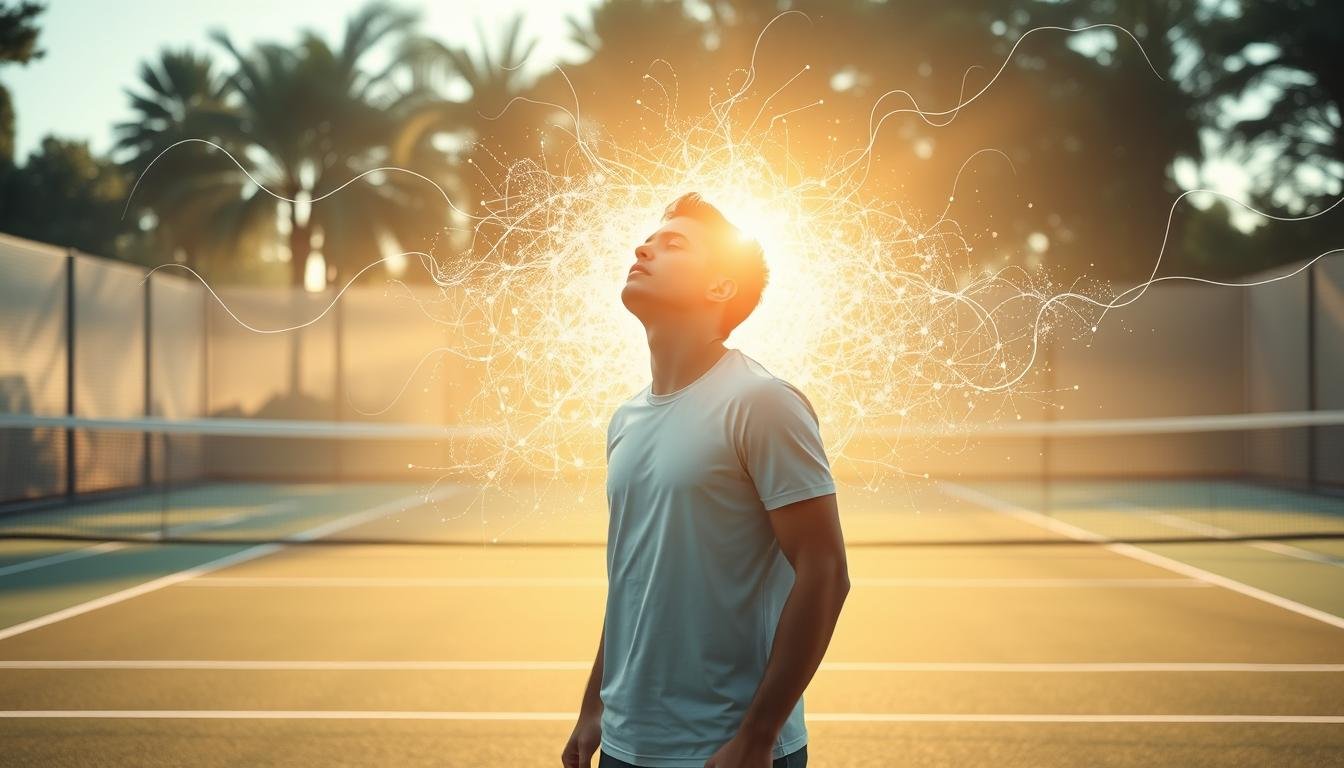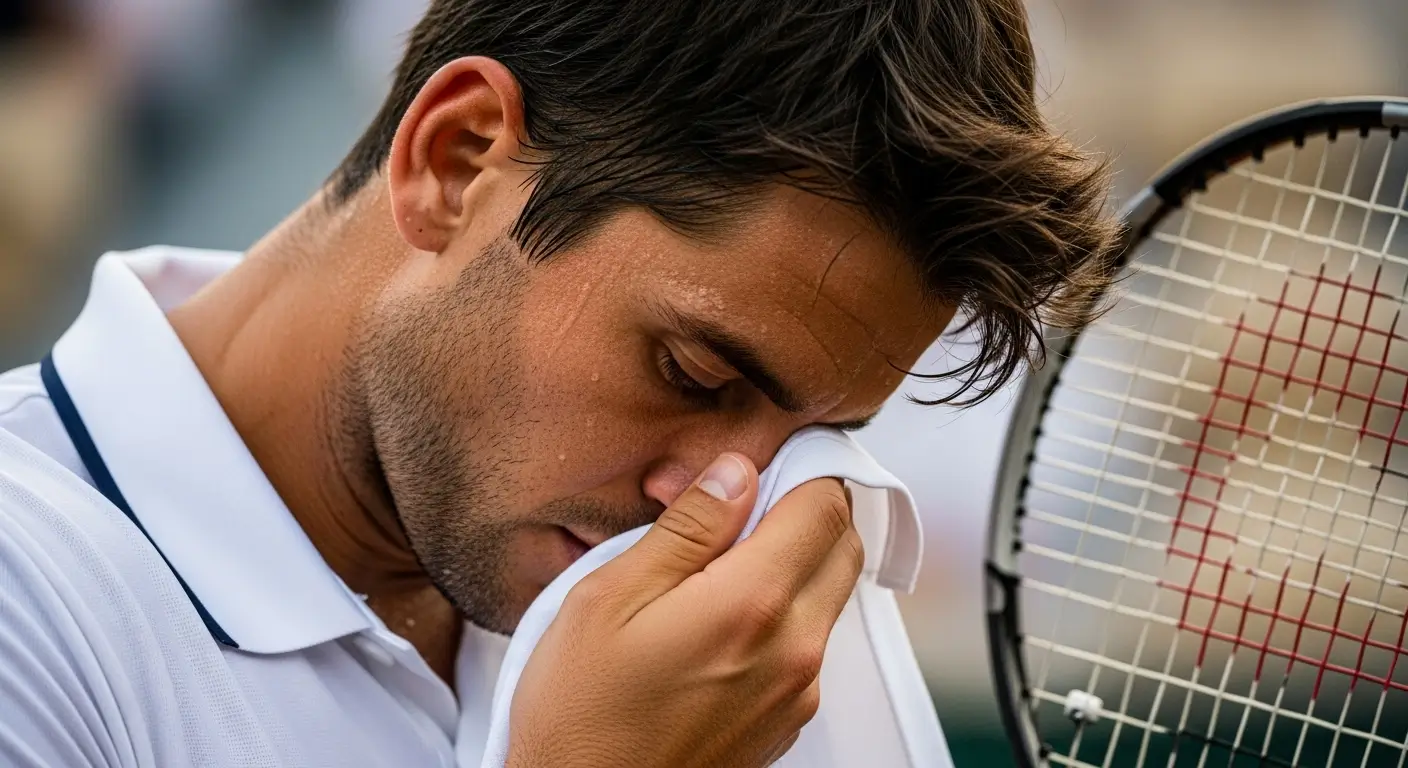You’ve probably heard that visualization is a powerful tool for achieving success in tennis. It helps boost your confidence, focus, and overall performance on the court.
Developing a strong mindset is crucial for mental transformation tennis. By mastering visualization techniques, you can overcome obstacles, stay focused under pressure, and gain a competitive edge.
Key Takeaways
- Visualization can improve your tennis performance by boosting confidence and focus.
- Mental imagery helps develop a strong mindset for competition.
- Mastering visualization techniques can give you a competitive edge.
- Regular practice of visualization can lead to mental transformation.
- A strong mindset is crucial for achieving success in tennis.
The Power of Mental Imagery in Tennis Performance
In tennis, seeing yourself succeed can change the game. Mental imagery lets you practice your game in your mind. It builds confidence and prepares you for different situations on the court.
Why Visualization Creates Champions
Visualization is a key habit for tennis champions. It lets them imagine success, building a champion mindset tennis. This mindset helps them face challenges and stay focused under pressure. It boosts their self-belief tennis, helping them perform at their best.
Top tennis players say visualization is key to their success. They imagine winning big points or beating tough opponents. This mental prep is a big part of their training.
The Mind-Body Connection on the Court
In tennis, mental toughness is as important as physical skill. Tennis psychology tips stress the mind-body connection. By mentally practicing, players can improve their physical skills and quickness.
| Mental Habit | Benefit |
|---|---|
| Visualization | Improved focus and confidence |
| Positive Self-Talk | Enhanced self-belief and resilience |
| Mental Rehearsal | Better preparation for match scenarios |
The table shows how mental habits like visualization are key to success. By adding these habits to their training, players can build a stronger, more resilient mindset.
“The mind is the limit. As long as the mind is willing to do it, you can accomplish anything.” – Novak Djokovic
This quote shows how crucial mental prep is in tennis. By using mental imagery, you can elevate your game.
The Science Behind Tennis Motivation and Visualization
Understanding tennis motivation and visualization can boost your game. Mental imagery can make your mental game stronger. This leads to better tennis performance.
Activating Neural Networks for Performance
Visualization in tennis works like actual play, linking mind and body. It strengthens the neural pathways for your actions. This boosts your mental strength tennis by preparing your brain for matches.
Research shows the brain can’t tell the difference between vivid visualization and real practice. This means regular visualization can improve muscle memory and performance. It’s not just mental practice; it’s physical improvement too.
Research-Backed Benefits for Tennis Players
Studies prove visualization greatly impacts tennis performance. It improves focus, reduces anxiety, and boosts confidence. Visualizing success can make your mindset more positive and improve your mental game tennis.
Visualization also builds resilience tennis by preparing for tough situations. Mentally rehearsing different scenarios helps you stay tough and focused. This mental strength is crucial for tennis success.
Essential Visualization Techniques for Tennis Mastery
Mastering tennis is not just about physical practice. It also needs a strong mental game through visualization techniques. By using visualization in your training, you can improve your performance on the court. It’s not just about imagining success; it’s about creating a mental plan for your game.
Outcome Visualization: Seeing Your Victory
Outcome visualization means picturing yourself winning or doing something great on the court. This builds confidence and a winning mentality. To practice, find a quiet place, close your eyes, and imagine yourself succeeding.
Process Visualization: Perfecting Your Strokes
Process visualization is about seeing the steps to success, like perfecting your serve or footwork. It helps refine your technique and build muscle memory. This is great for mental coaching tennis, focusing on areas needing improvement.
Emotional Visualization: Feeling the Success
Emotional visualization is about feeling the joy of winning or a well-played match. It’s key for confidence building tennis, connecting with positive feelings from success. Regular practice boosts your mindset and game.
Developing a Champion Mindset Through Mental Training
The difference between a good and great tennis player often lies in their mental game. Mental training is key for players aiming to improve. It helps them reach their full potential.
Building Unshakable Self-Belief on the Court
Self-belief is crucial for a champion mindset. It means trusting yourself and your skills. To build this, focus on positive thoughts and visualization.
Visualization Exercises for Confidence Building
Visualization boosts confidence. Try this: Close your eyes and picture yourself winning a perfect match. See your shots and success. Do this often to build positive thoughts.
Transforming Self-Talk Through Mental Imagery
Your words to yourself can help or hurt your confidence. Use mental images to change your self-talk. Imagine saying, “I am strong,” or “I can handle anything.”
Creating a Winning Mentality for Match Play
A winning mindset means being focused, resilient, and adaptable. It’s about staying calm and making smart choices. Practice visualizing match scenarios to prepare for anything.
Key strategies for a winning mindset include:
- Focusing on the present moment
- Staying positive, even when things get tough
- Being open to different strategies
By using these strategies in your mental training, you’ll be ready for match challenges. You’ll develop a champion mindset.
Integrating Visualization Into Your Tennis Training Routine
Adding visualization to your tennis training can make your mental game stronger. It’s a powerful tool that can help you perform better. To get the most out of it, make sure to include it in your daily training.
Pre-Match Mental Preparation Protocol
Before you play, use visualization as part of your mental prep. Find a quiet spot, relax, and focus on your breathing. Then, imagine yourself playing well, focusing on your moves and strategies.
This technique builds confidence and prepares you for the game. Create a mental script that includes overcoming challenges and staying focused. Visualizing different scenarios helps you stay calm under pressure.
Between-Points Visualization Techniques
Between points, take a moment to visualize your next shot or strategy. This keeps you focused and competitive. Imagine yourself making a perfect shot, feeling the joy of a well-placed volley or the power of a strong serve.
Using these techniques keeps your mindset positive and focused on your goals. Even when things get tough, you’ll stay on track.
Post-Match Mental Review Process
After the game, review your performance mentally. Think about the key moments, both good and bad. Analyze what you could have done differently.
| Visualization Technique | When to Use | Benefits |
|---|---|---|
| Pre-Match Visualization | Before a match | Boosts confidence, prepares for challenges |
| Between-Points Visualization | During a match, between points | Maintains focus, enhances strategy |
| Post-Match Mental Review | After a match | Facilitates learning, improves future performance |
By using these visualization techniques, you can improve your mental game and performance. They give you an edge on the court.
Building Mental Resilience in Tennis Through Visualization
Building mental resilience is key for tennis players to beat challenges and win. Visualization is a big help in getting ready for the game’s demands.
Overcoming Setbacks and Disappointments
Tennis is as much a mental game as it is physical. Players face setbacks and disappointments, like losing a key point or getting hurt. Visualization helps players overcome these challenges by practicing different scenarios in their mind. This builds resilience.
By imagining themselves doing well in tough situations, players gain the mental strength to perform under pressure.
Visualizing Success Through Challenging Situations
Seeing oneself succeed in tough situations is a powerful way to build mental resilience. This means picturing oneself doing well in hard conditions or against tough opponents. It helps in developing a winning mindset and prepares players for the mental challenges of competition.
Pressure Point Visualization Drills
One effective drill is visualizing high-pressure situations, like tiebreakers or match points. Players should picture themselves staying focused and making their shots. This builds confidence and mental toughness.
Comeback Scenario Mental Training
Another valuable technique is imagining comeback scenarios. Players picture themselves being down in a match but winning it. This mental training boosts resilience and the belief in overcoming adversity.
| Visualization Technique | Benefit |
|---|---|
| Pressure Point Visualization Drills | Builds confidence and mental toughness |
| Comeback Scenario Mental Training | Enhances resilience and belief in overcoming adversity |
By using these visualization techniques in their training, tennis players can build the mental resilience needed to excel. Regular practice of these drills keeps players focused and motivated, even when faced with challenges.
Pro-Level Mental Game: Visualization Secrets from Tennis Champions
Tennis champions aren’t just born with talent; they also develop a winning mindset. They use powerful visualization techniques. The mental game is key in tennis, and top players have mastered visualization to get ahead.
Case Studies: How Elite Players Use Mental Imagery
Players like Novak Djokovic and Serena Williams talk about the power of visualization. Djokovic uses it to prepare for matches, imagining himself winning. Visualization keeps him focused and confident. Serena Williams also visualizes her shots and strategies before a match, helping her play better.
Adapting Professional Techniques to Your Level
You don’t have to be a pro to use visualization. Start simple by imagining yourself making great shots or overcoming tough situations. Consistency is key; the more you practice, the more natural it becomes.
To improve, focus on a champion mindset tennis approach. This means not just seeing yourself win but also preparing for challenges. This boosts your tennis motivation and builds a winning mentality tennis for success on and off the court.
Measuring Your Mental Transformation in Tennis
How well your mindset training tennis works can be seen by looking at your game’s changes. Using visualization in your training will help you get better mentally and play better overall.

Tracking Visualization Progress and Results
To see how your mental coaching tennis is helping, keep a journal of your matches and practice. Write down your thoughts, feelings, and physical sensations during these times. Over time, you’ll spot patterns and see where your positive thinking tennis is helping. You might see fewer mistakes or better focus under pressure.
Adjusting Your Mental Training for Continuous Improvement
As you track your progress, you can build confidence in tennis by tweaking your mental training. If some visualizations aren’t working, change them or try new ones. You might adjust how often or long you visualize, or add more details to make it clearer. By always improving your mental training, you’ll keep playing at a high level and keep growing as a player.
Conclusion: Transforming Your Tennis Through the Power of Visualization
Visualization is a key tool for improving your tennis game. It helps boost your motivation and builds a champion mindset. The methods shared in this article aim to help you develop a winning attitude and undergo a mental shift.
Regular practice of visualization exercises is crucial. Focus on the outcome, the process, and your emotions. This will enhance your mental game, leading to better performance on the court. By using these strategies, you’ll be closer to reaching your tennis goals and developing a champion mindset.
It’s time to apply these techniques. With hard work and dedication, you can visualize your way to tennis success. Start your mental training today and see how visualization can transform your game.
FAQ
What is visualization mastery in tennis, and how can it improve my game?
Visualization mastery in tennis means using mental images to improve your game. It boosts your motivation and confidence. This leads to better results in your matches.
How does mental imagery affect my tennis performance?
Mental imagery greatly affects your tennis performance. It shapes your mindset, emotions, and physical actions. Visualization helps you develop a winning mindset and perform better under pressure.
What are the different types of visualization techniques I can use in tennis?
There are several visualization techniques for tennis. Outcome visualization is imagining winning a match. Process visualization focuses on perfecting your strokes. Emotional visualization connects you with success and confidence.
How can I integrate visualization into my tennis training routine?
To add visualization to your training, set aside time before and after matches. Use it during play to stay focused. Daily visualization exercises build mental resilience and a champion mindset.
Can visualization really help me build mental resilience in tennis?
Yes, visualization is key to building mental resilience in tennis. It helps you overcome challenges and stay confident, even under pressure.
How do professional tennis players use visualization techniques?
Professional players use visualization to prepare mentally. They imagine their matches and opponents to build confidence and focus. You can use these techniques to improve your mental game.
How can I measure the effectiveness of visualization in my tennis game?
Track your progress and results to see how visualization works. Adjust your mental training to improve your visualization techniques and keep getting better.
What are some common challenges I may face when using visualization techniques in tennis?
Challenges include staying consistent, overcoming distractions, and creating a clear mental image. Practice regularly, use guided exercises, and build mental strength to overcome these.



